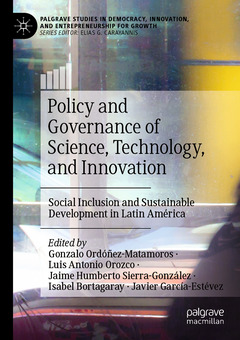Description
Policy and Governance of Science, Technology, and Innovation, 1st ed. 2021
Social Inclusion and Sustainable Development in Latin América
Palgrave Studies in Democracy, Innovation, and Entrepreneurship for Growth Series
Language: English
Subjects for Policy and Governance of Science, Technology, and Innovation:
Publication date: 10-2022
340 p. · 14.8x21 cm · Paperback
Publication date: 10-2021
340 p. · 14.8x21 cm · Hardback
Description
/li>Contents
/li>Biography
/li>Comment
/li>
1. Introduction: Science, Technology and Innovation Policy and Governance for Social Inclusion and Sustainable Development in Latin America.- PART 1. INNOVATION POLICY.- 2. Toward a typology of public innovation. Eccentric, discrete, flat and transformative innovation.- 3. Mission-Oriented Innovation Policies: An Approach to Two Colombian Cases.- 4. Innovation policies for an inclusive and sustainable development: Insights from Central America.- 5. Towards a Regional Policy: Transformative Innovation in Colombia.- 6. Transformative Innovation Policy in emerging economies: what does it entail?.- 7. A study of innovation policies and governance structures in emerging economies under the path-dependence framework. The case of Colombia.- PART 2. STI GOVERNANCE.- 8. Innovation policy implementation on an operational basis: policy instruments, networks and governance in the case of Colombia.- 9. Regional diversification, technological trajectories and policy approaches. The case of Argentina’s satellite industry.- 10. Structure and Operation of the National Policy Councils for Science, Technology and Innovation: the cases of Chile and Spain.- 11. Adequacy of Governance of Science, Technology and Innovation in Developing Countries: The Colombian Case.- 12. Innovation Financing: A Proposal to Strengthen the Colombian Setting.
Gonzalo Ordóñez-Matamoros is the Dean of the School of Finance, Government, and International Relations at the Universidad Externado de Colombia and Assistant Professor at the School of Behavioural, Management and Social Sciences at the University of Twente – The Netherlands.
Luis Antonio Orozco is a Full Professor in the School of Management at the Universidad Externado de Colombia and a senior researcher at the Colombian Ministry of Science, Technology and Innovation.




